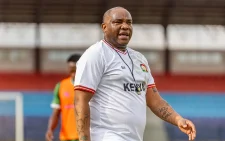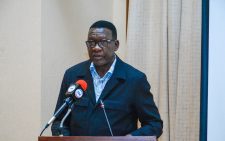Spotlight on NIS as abductions persist

Focus now shifts to the National Intelligence Service (NIS) after the Inspector General of Police and the Director of Criminal Investigations admitted that citizens were being abducted but denied that police were involved.
IG Douglas Kanja, for the umpteenth time, denied police involvement while DCI Mohammed Amin, whose officers are responsible for investigating such cases, has maintained that not all officers in civilian clothes and unmarked vehicles are agents of the Directorate of Criminal Investigations.
Coincidentally, almost all of the abducted individuals are social media users who are critics of President Ruto and his administration. Kanja, Amin and President Ruto and Interior Cabinet Secretary Kipchumba Murkomen have inadvertently acknowledged that there are cases of abduction but maintain that they do not know who is behind them.
“We will ensure we end the abduction which is being talked about in the country. We want every Kenyan to live peacefully,” the President said.
As for Murkomen, he said: “We will not harm people because they hate us, there is no policy for that. Those who violate the Cyber Crimes Act we will bring them before justice.”
Similar pattern
With the President, Kanja, Amin and the recently appointed Murkomen all admitting that abductions are happening, but absolving themselves from blame, fingers are now being pointed at the intelligence service that has always operated discreetly.
Interestingly, all the abductions share a similar pattern, with Subarus being used by visibly bold and unshaken men armed with AK-47 rifles and in broad daylight. And despite footage from CCTV cameras being provided to the authorities, the lack of interest among security agencies to dig deeper has also raised more questions than answers.
Considering the main functions of the NIS and the recent developments, the service is now right in the eye of a storm over abductions.
Some of the functions of the NIS are supporting and aiding law enforcement agencies in detecting and preventing serious crimes, collecting intelligence to be shared with relevant State agencies, and identifying threats or potential threats to national security.
New role
Since the outbreak nationwide protests led by young people that shook the foundations of President Ruto’s administration, NIS under Noordin Haji has been playing a pivotal role in the country’s administration.
The protests, which erupted in response to perceived bad governance, left a trail of destruction across the country. According to the Kenya Human Rights Commission, 60 people died, 415 were injured, and 66 are still missing.
These demonstrations forced President Ruto to reassess his leadership and seek counsel from the intelligence service, which he had largely ignored in the early days of his administration.
Sources say NIS has become a crucial cog in Ruto’s administration, providing critical intelligence reports that the President has relied on to stabilise his government.
The outfit is said to have been actively involved in the recent appointment of allies of former prime minister Raila Odinga and former President Uhuru Kenyatta to Ruto’s “broad-based government”, impeachment of deputy president Rigathi Gachagua and Raila’s bid for the African Union Commission chairmanship.
Sources in government say after the Gen Z protests, NIS has been rejuvenated to play the roles and mandates it wielded under the late President Daniel arap Moi.
“Even if they are not involved, it is completely unfathomable that they have not established the motive and the identity of the abductors, and the whereabouts of the abductees,” a security expert told People Daily.
Gachagua claims
On Friday, Gachagua provided hints about the people behind the abductions, claiming that the unit operates independently of the Inspector General of Police, and is led by a man he identified only as “Abel”, a relative of a senior government official.
“There is a unit that is not under the command of the Inspector General of Police. It operates out of the 21st floor of a building in Nairobi’s city centre, led by a certain ‘Mr Abel’, who is a cousin of a very senior official in this government,” claimed Gachagua.
“If this unit is not dismantled, we will reveal the name of the building and the full identities of the officer and his cousin.”
Gachagua further recalled his criticism of NIS a few months ago, saying: “When I raised concerns about the dysfunctionality of the NIS, I was accused of being insubordinate. However, the events of recent months have unfortunately proven me right.”
Ironically, while the abductions have sparked uproar among Kenyans, including Raila, former Chief Justice David Maraga and the Law Society of Kenya, government apologists led by National Assembly Majority Leader Kimani Ichung’wah and Minority Leader Junet Mohamed have appeared to justify them, with the latter warning against the use of social media to mock the President.
“You allow your children to draw images of leaders and put them in the coffin and when the action is taken you start crying and making noise. Why did you allow your children to commit the crime in the first place? Having such images of people put in coffins is akin to killing them,” Junet said.
Officer charged
According to the government-funded Kenya National Commission on Human Rights, 13 people have been abducted and disappeared mysteriously in the last three months alone, bringing to 82 the total cases since the Gen Z protests broke out in June.
This month alone, six Kenyans have been abducted. They are Steve Kavingo from Machakos; Billy Mwangi from Embu; Peter Muteti from Uthiru, Nairobi; Bernard Kavuli from Ngong, Nairobi; Gideon Kibet from Nairobi; and Rony Kiplang’at from Kiambu.
In one of the cases pending in courts, an NIS officer is one of the accused persons and was said to have subjected the victims to “inhumane, cruel and degrading treatment”.
There are few known cases where the National Police Service has investigated officers from the NIS.
But the NPS is expected to be more accountable for their actions following the planned establishment of the Intelligence Service Complaints Board, created under Section 66 of the NIS Service Act, 2012.
The NIS operates in secrecy and its budget, staffing and operations are a secret, but the proposed board will ensure that it discharges its work transparently and with accountability, and ensure that its officers do not exercise their powers arbitrarily.
On May 23 last year, Haji, when he was being vetted for the position of Director General of the NIS, acknowledged that at least one NIS officer had been involved in a case of extrajudicial killing.











